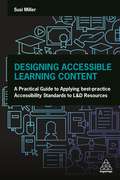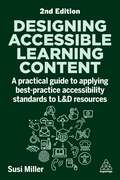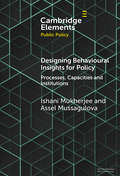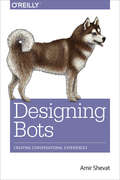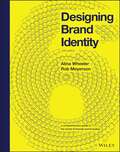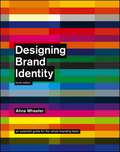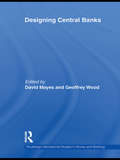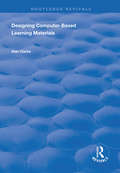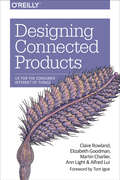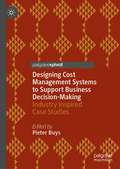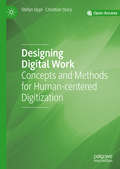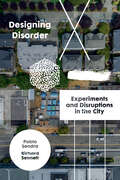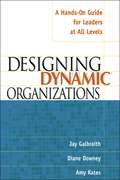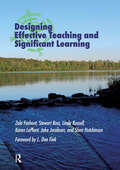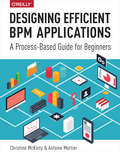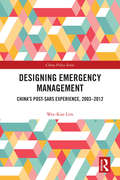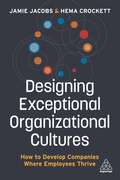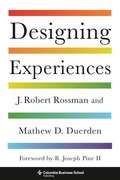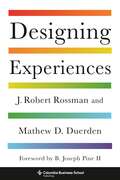- Table View
- List View
Designing Accessible Learning Content: A Practical Guide to Applying best-practice Accessibility Standards to L&D Resources
by Susi MillerMaking learning and development (L&D) content inclusive and accessible for everyone is not only a good thing to do, it's the right thing to do. Designing Accessible Learning Content provides evidence-based advice on designing digital learning content that ensures all learners are included and are therefore able to perform to their full potential.This is a practical guide on accessibility for anyone involved in the design, creation, development or testing of online learning content. It provides detailed guidance on how to meet the Web Content Accessibility Guidelines making it essential reading for L&D professionals, instructional designers and course developers who need to comply with legal accessibility requirements. Using the author's 'eLearning Accessibility Framework', Designing Accessible Learning Content demystifies sometimes complex technical accessibility standards and provides an easy to follow contextual framework uniquely designed for learning content created using any authoring tool.This book also demonstrates how creating accessible learning content can improve usability and provide the best possible learning experience for everyone. In addition, it offers essential background information such as a focus on disability, an overview of assistive technology and an exploration of the case for digital accessibility. This guarantees that L&D professionals have the vital background knowledge they need to make sense of accessibility before they begin practically applying the principles. With online checklists, learner case studies, and industry perspectives, Designing Accessible Content is an essential handbook for all L&D professionals seeking to harness the benefits of accessibility in order to improve their learning content for everyone.
Designing Accessible Learning Content: A Practical Guide to Applying best-practice Accessibility Standards to L&D Resources
by Susi MillerMaking learning and development (L&D) content inclusive and accessible for everyone is not only a good thing to do, it's the right thing to do.Designing Accessible Learning Content is a practical guide on accessibility for anyone involved in the design, creation, development or testing of online learning content. Now updated to include detailed guidelines on the Web Content Accessibility Guidelines and the nine new standards, this book provides HR and OD professionals and academics with evidence-based advice on designing inclusive digital learning content.Featuring real-world examples from industry-leading brands, this book demonstrates how accessible learning content can improve usability and provide the best possible learning experience for all. It is an essential handbook for all L&D professionals seeking to harness the benefits of accessibility in order to improve their learning content for everyone.
Designing Behavioural Insights for Policy: Processes, Capacities & Institutions (Elements in Public Policy)
by Ishani Mukherjee Assel MussagulovaThe diversity of knowledge surrounding behavioural insights (BI) means in the policy sciences, although visible, remains under-theorized with scant comparative and generalizable explorations of the procedural prerequisites for their effective design, both as stand-alone tools and as part of dedicated policy 'toolkits'. While comparative analyses of the content of BI tools has proliferated, the knowledge gap about the procedural needs of BI policy design is growing recognizably, as the range of BI responses grows in practice necessitating specific capabilities, processes and institutional frameworks to be in place for their design. This Element draws on the literature on policy design and innovation adoption to explore the administrative, institutional and capacity endowments of governments for the successful and appropriate integration of BI in existing policy frameworks. Further, we present three illustrative cases with respect to their experience of essential procedural endowments facilitating for the effective integration of BI in policy design.
Designing Bots: Creating Conversational Experiences
by Amir ShevatFrom Facebook Messenger to Kik, and from Slack bots to Google Assistant, Amazon Alexa, and email bots, the new conversational apps are revolutionizing the way we interact with software. This practical guide shows you how to design and build great conversational experiences and delightful bots that help people be more productive, whether it’s for a new consumer service or an enterprise efficiency product.Ideal for designers, product managers, and entrepreneurs, this book explores what works and what doesn’t in real-world bot examples, and provides practical design patterns for your bot-building toolbox. You’ll learn how to use an effective onboarding process, outline different flows, define a bot personality, and choose the right balance of rich control and text.Explore different bot use-cases and design best practicesUnderstand bot anatomy—such as brand and personality, conversations, advanced UI controls—and their associated design patternsLearn steps for building a Facebook Messenger consumer bot and a Slack business botExplore the lessons learned and shared experiences of designers and entrepreneurs who have built botsDesign and prototype your first bot, and experiment with user feedback
Designing Brand Identity: A Comprehensive Guide to the World of Brands and Branding
by Alina Wheeler Rob MeyersonIt’s harder than ever to be the brand of choice―in many markets, technology has lowered barriers to entry, increasing competition. Everything is digital and the need for fresh content is relentless. Decisions that used to be straightforward are now complicated by rapid advances in technology, the pandemic, political polarization, and numerous social and cultural changes. The sixth edition of Designing Brand Identity has been updated throughout to address the challenges faced by branding professionals today. This best-selling book demystifies branding, explains the fundamentals, and gives practitioners a roadmap to create sustainable and successful brands. With each topic covered in a single spread, the book celebrates great design and strategy while adding new thinking, new case studies, and future-facing, global perspectives.
Designing Brand Identity: An Essential Guide for the Whole Branding Team
by Alina Wheeler<p>A revised new edition of the bestselling toolkit for creating, building, and maintaining a strong brand <p>From research and analysis through brand strategy, design development through application design, and identity standards through launch and governance, Designing Brand Identity, Fourth Edition offers brand managers, marketers, and designers a proven, universal five-phase process for creating and implementing effective brand identity. Enriched by new case studies showcasing successful world-class brands, this Fourth Edition brings readers up to date with a detailed look at the latest trends in branding, including social networks, mobile devices, global markets, apps, video, and virtual brands.</p>
Designing Central Banks (Routledge International Studies in Money and Banking)
by David MayesThe activities of central banks are relevant to everyone in society. This book starts by considering how and why in general central banks evolved and specifically the special aspects of the contribution of the Northern European Central Banking Tradition. With that foundation, the book will then turn to a series of contemporary themes. Firstly, this book looks at independence, how central banks can actually influence their respective economies, goals, responsibilities and governance. This collection of papers, formulated from the joint conference of the Bank of Finland and the Deutsche Bundesbank in November 2007, will help motivate continuing research into the institutional design of central banks and promote a better understanding of the many challenges central banks are facing today. This volume gives a detailed perspective on the benefits of price stability and central bank independence and, due to the advances in macroeconomic theory, has prompted a substantial rethink on central banks’ institutional design. With contributions from such scholars as Anne Sibert and Forrest Capie and a foreword by Erkki Liikanen and Professor Axel A. Weber, this volume will be useful reading for monetary economists around the world as well as all those with an interest in central banks and banking more generally.
Designing Channels of Distribution
by V. Kasturi RanganPresents a framework and a method for addressing the new product channel choice decision. Offers a six-step method that involves: 1) disaggregating and prioritizing a distribution channel by customers' channel function requirements; 2) obtaining and combining customers' (and key informants) evaluations of the channel functions; 3) benchmarking existing channels (own as well as competitors'); 4) identifying and constructing effective channel alternatives; 5) quantifying the short-term and long-term benefits and costs of each alternative; and 6) selecting the appropriate channel by trading off the opportunities versus constraints posed by existing channel networks (if applicable). The method requires extensive management participation to facilitate its implementation. Provides an illustrative application to demonstrate its managerial usefulness.
Designing Climate Solutions: A Policy Guide for Low-Carbon Energy
by Hal Harvey Robbie Orvis Jeffrey RissmanWith the effects of climate change already upon us, the need to cut global greenhouse gas emissions is nothing less than urgent. It's a daunting challenge, but the technologies and strategies to meet it exist today. A small set of energy policies, designed and implemented well, can put us on the path to a low carbon future. Energy systems are large and complex, so energy policy must be focused and cost-effective. One-size-fits-all approaches simply won't get the job done. Policymakers need a clear, comprehensive resource that outlines the energy policies that will have the biggest impact on our climate future, anddescribes how to design these policies well.Designing Climate Solutions:A Policy Guide for Low-Carbon Energy is the first such guide, bringing together the latest research and analysis around low carbon energy solutions. Written by Hal Harvey, CEO of the policy firm Energy Innovation, with Robbie Orvis and Jeffrey Rissman of Energy Innovation, Designing Climate Solutions is an accessible resource on lowering carbon emissions for policymakers, activists, philanthropists, and others in the climate and energy community. In Part I, the authors deliver a roadmap for understanding which countries, sectors, and sources produce the greatest amount of greenhouse gas emissions, and give readers the tools to select and design efficient policies for each of these sectors. In Part II, they break down each type of policy, from renewable portfolio standards to carbon pricing, offering key design principles and case studies where each policy has been implemented successfully.We don't need to wait for new technologies or strategies to create a low carbon future—and we can't afford to. Designing Climate Solutions gives professionals the tools they need to select, design, and implement the policies that can put us on the path to a livable climate future.
Designing Companywide Transition-Acceleration Systems: Basic Design Principles
by Michael D. WatkinsWhile there are many different types of transitions leaders will go through in their careers, there are certain underlying imperatives that are fundamental to all of them: to diagnose the situation rapidly and well, to crystallize the organizational-change and personal development challenges, to craft a plan that creates momentum, and to manage them for personal excellence. What are the implications for how companies should accelerate key transitions? In this chapter, transition acceleration expert Michael Watkins briefly outlines principles developed over years of working with leading companies that can be applied to build a transition-acceleration solution that's right for your company. This chapter was originally published as the Conclusion of "Your Next Move: The Leader's Guide to Navigating Major Career Transitions."
Designing Computer-Based Learning Materials (Routledge Revivals)
by Alan ClarkeFirst published in 2001, this volume demonstrates how computer-based learning has the potential to provide a highly motivating learning experience, that it also has the potential to achieve exactly the opposite, and that the difference between these two extremes is the quality of the learning design. The challenge for the learning designer isn’t a simple one. You are being asked to prepare interactive learning for someone you can’t see and with whom the only interaction you are likely to have is via limited written communication. Fortunately help is at hand in Alan Clarke’s Designing Computer-Based Learning Materials. Dr. Clarke offers a definitive guide to each of the many elements involved in good design. This book explores the principles of adult learning, and relates to the potential, features and impact of computer-based learning. This is not a ‘how to…’ book, but rather one seeking to help you understand the different elements which go into computer-based learning. If you are commissioning material, it will help you to understand the contractors’ constraints. If you are designing materials yourself, it will allow you to avoid many of the errors it is all too easy to make when developing them. Computer-based learning materials are not all the same: their range reflects the variety of learners that use them and purposes they are used for; the different learning environments that are available to people; the different subjects that they wish to learn and the level to which they wish to take them. In the face of such a complex task, involving so many factors and variables, it is essential that the learning designer understands what is involved and uses a rigorous process for envisioning, planning, designing, implementing and testing their solution. This is a book about learning design and not about software production and, as such, it provides any aspiring designers with the fundamentals of producing the highly motivating learning experience, which should be their objective.
Designing Connected Products: UX for the Consumer Internet of Things
by Elizabeth Goodman Claire Rowland Martin Charlier Ann Light Alfred LuiNetworked thermostats, fitness monitors, and door locks show that the Internet of Things can (and will) enable new ways for people to interact with the world around them. But designing connected products for consumers brings new challenges beyond conventional software UI and interaction design.This book provides experienced UX designers and technologists with a clear and practical roadmap for approaching consumer product strategy and design in this novel market. By drawing on the best of current design practice and academic research, Designing Connected Products delivers sound advice for working with cross-device interactions and the complex ecosystems inherent in IoT technology.
Designing Cost Management Systems to Support Business Decision-Making: Industry Inspired Case Studies
by Pieter BuysThis book illustrates the importance effective cost management systems inproviding a supportive environment in which reliable and relevant managementinformation can be generated. Such a cost management system is only attainableif the importance of key business, operational and stakeholder requirements arerecognised within the organisational context. In illustrating this importance, thisbook provides several case studies as examples thereof. The first two case studiesfocus on the engineering sector and illustrates the development of a costmanagement system in a water recycling context; and the design of a budgetarysystem in a mining engineering context. The remaining case studies focus on theservices sector, including cost management systems for a digital technologyservices provider and a medical insurance services provider; an alternativeactivity-based costing approach for a public sector services provider; and finallya re-designed value stream for an automotive services provider. Academicresearchers and industry managers in the fields of management accounting andfinancial management, as well as engineering and operations management, willfind value in the experiences described herein.
Designing Digital Work: Concepts and Methods for Human-centered Digitization
by Christian Stary Stefan OpplCombining theory, methodology and tools, this open access book illustrates how to guide innovation in today’s digitized business environment. Highlighting the importance of human knowledge and experience in implementing business processes, the authors take a conceptual perspective to explore the challenges and issues currently facing organizations. Subsequent chapters put these concepts into practice, discussing instruments that can be used to support the articulation and alignment of knowledge within work processes. A timely and comprehensive set of tools and case studies, this book is essential reading for those researching innovation and digitization, organization and business strategy.
Designing Disorder: Experiments and Disruptions in the City
by Richard Sennett Pablo SendraA manifesto for the Open City: vibrant, disordered, adaptable.In 1970 Richard Sennett published the ground breaking The Uses of Disorder, that the ideal of a planned and ordered city was flawed, likely to produce a fragile, restrictive urban environment. Fifty years later, Sennett returns to these still fertile ideas and alongside campaigner and architect, Pablo Sendra, sets out an agenda for the design and ethics of the Open City. The public spaces of our cities are under siege from planners, privatisation and increased surveillance. Our streets are becoming ever more lifeless and ordered. What is to be done? Can disorder be designed? Is it possible to maintain the public realm as a flexible space that adapts over time? In this provocative essay Sendra and Sennett propose a reorganisation of how we think and plan the social life of our cities. What the authors call 'Infrastructures of disorder' combine architecture, politics, urban planning and activism in order to develop places that nurture rather than stifle, bring together rather than divide up, remain open to change rather than closed off. The book proves that ideas of disorder are still some of the most radical and transformative in debates on 21st century cities.
Designing Dynamic Organizations: A Hands-on Guide for Leaders at All Levels
by Amy Kates Jay Galbraith Diane DowneyWhich business structures are best suited to the unpredictable 21st century? How can a business reconfigure itself with minimum disruption and maximum impact?Every executive grapples with problems of restructuring--and most need hands-on guidance to solve them. Based on Jay Galbraith&’s world-renowned approach to organization design and featuring a broad selection of practical tips and tools developed by Diane Downey and Amy Kates, Designing Dynamic Organizations gives business leaders at all levels everything they need to implement positive, progressive change.In this book, business executives will learn how to examine their choices by leading them systematically through these fundamental questions:Should we restructure to meet our strategic goals?What are the best structural options to achieve our success?What lateral processes are necessary to support the new structure?How do we staff the restructured organization to optimize results?Designing Dynamic Organizations includes examples and worksheets that pilot you through the essential steps of organizational design.
Designing Effective Teaching and Significant Learning
by Stewart Ross Jake Jacobson Zala Fashant Linda Russell Karen LaPlantDesigning courses to deliver effective teaching and significant learning is the best way to set students up for success, and this book guides readers through the process. The authors have worked with faculty world-wide, and share the stories of how faculty have transformed courses from theory to practice. They start with Dee Fink’s foundation of integrating course design. Then they provide additional design concepts to expand the course blueprint to implement plans for communication, accessibility, technology integration, as well as the assessment of course design as it fits into the assessment of programs and institutions, and how faculty can use what they learn to meet their professional goals.
Designing Efficient BPM Applications: A Process-Based Guide for Beginners
by Antoine Mottier Christine McKintyLooking for efficiency gains in your business? If you’re a business analyst, this practical guide will show you how to design effective business process management (BPM) applications. Every business uses business processes—these everyday tasks help you gain and retain customers, stay profitable, and keep your operations infrastructure functioning.BPM specialists Christine McKinty and Antoine Mottier show you step-by-step how to turn a simple business procedure into an automated, process-based application. Using hands-on examples, you’ll quickly learn how to create an online process that’s easy to use. Each chapter builds on earlier material.You don’t have to have any programming experience to design business processes—and if you have skills in designing workflows and understanding human interactions with processes, you already have a headstart.Through the course of this book, you will:Build a prototype of an application pageCreate the most frequent use flow in a process, and define the data modelGenerate real process forms and produce the first version of the applicationConnect your application to external information systems, and then build and test the complete application
Designing Emergency Management: China’s Post-SARS Experience, 2003-2012 (China Policy Series)
by Wee-Kiat LimThis book looks at the then-nascent emergency management sector in China, specifically from 2003-2012, that arose from the 2003 SARS crisis and subsequently set the stage for its responses to the COVID-19 pandemic. Covering not only the amended and new laws and regulations at the national level, the book also includes the rearrangement and creation of the organizational structures, as well as the response plans for individual emergencies that were either recrafted or produced during this period. Beyond chronicling the milestones and products of this transformation, this book highlights key ideas and ideals that guided the various stakeholders, from the governing elites to the policy experts in this process. The book demonstrates how definitions of emergency management and emergency categories, as well as other ideational objects were initially either absent or weakly developed, but were refined and to the extent that they helped corral disparate actors into the new organizational field of emergency management.
Designing Exceptional Organizational Cultures: How to Develop Companies where Employees Thrive
by Jamie Jacobs Hema CrockettDesigning Exceptional Organizational Cultures is a practical guide for HR and OD professionals which explains how to proactively design, build and foster a culture that creates employee and business success. For a company to outperform the competition and achieve sustainable business growth, it needs a high performing, engaged and committed workforce with the skills the business needs both now and in the future. Attracting, motivating and retaining top talent can't be done simply by attaching individual benefits to specific job roles. To be effective, companies need to build an exceptional company culture where people want to work and that allows them to develop and perform to their full potential. Designing Exceptional Organizational Cultures provides guidance on all elements of building a top performing culture including how to identify and define core company values and embed them throughout policies, processes and behaviours as well as how to create an organizational structure that leverages employees' strengths for optimum performance. It also covers how to assess what roles the business needs, how to recruit for future success and make the most of non-traditional hires as well as covering employee engagement, motivation, reward, diversity and Learning and Development (L&D). With practical examples, tips and advice throughout , this is crucial reading for anyone needing to build a culture that attracts the very best talent and achieve sustainable business growth.
Designing Executive Compensation at Kongsberg Automotive (A)
by Suraj Srinivasan Quinn PitcherDesigning Executive Compensation at Kongsberg Automotive (A) by Suraj Srinivasan, Quinn Pitcher
Designing Executive Compensation at Kongsberg Automotive (B)
by Suraj Srinivasan Quinn PitcherDesigning Executive Compensation at Kongsberg Automotive (B) by Suraj Srinivasan, Quinn Pitcher
Designing Exhibitions: Museums, Heritage, Trade and World Fairs
by Giles VelardeWhether a world fair, an art gallery, a museum or trade show, all exhibitions deal with the same basic commodities, objects and informative space.A The skill of the exhibition designer lies in using suitable techniques to ensure that the objects are explained in an accessible way to the widest audience. This guide deals with the whole range of exhibition design, describing both people and processes involved in briefing, mounting, maintaining and evaluating exhibitions. It provides the essential principles of designing an exhibition, whatever its nature and size, and serves as an introduction for the non-specialist and a guide to good practice for students and professionals alike.
Designing Experiences (Columbia Business School Publishing)
by J. Rossman Mathew Duerden B. PineIn an increasingly experience-driven economy, companies that deliver great experiences thrive, and those that do not die. Yet many organizations face difficulties implementing a vision of delivering experiences beyond the provision of goods and services. Because experience design concepts and approaches are spread across multiple, often disconnected disciplines, there is no book that succinctly explains to students and aspiring professionals how to design them. J. Robert Rossman and Mathew D. Duerden present a comprehensive and accessible introduction to experience design. They synthesize the fundamental theories and methods from multiple disciplines and lay out a process for designing experiences from start to finish. Rossman and Duerden challenge us to reflect on what makes a great experience from the user's perspective. They provide a framework of experience types, explaining people's engagement with products and services and what makes experiences personal and fulfilling. The book presents interdisciplinary research underlying key concepts such as memory, intentionality, and dramatic structure in a down-to-earth style, drawing attention to both the macro and micro levels. Designing Experiences features detailed instructions and numerous real-world examples that clarify theoretical principles, making it useful for students and professionals. An invaluable overview of a growing field, the book provides readers with the tools they need to design innovative and indelible experiences and to move their organizations into the experience economy. Designing Experiences features a foreword by B. Joseph Pine II.
Designing Experiences: Designing Leisure Experiences: 5th Edition (Columbia Business School Publishing Ser.)
by J. Robert Rossman Mathew D. DuerdenIn an increasingly experience-driven economy, companies that deliver great experiences thrive, and those that do not die. Yet many organizations face difficulties implementing a vision of delivering experiences beyond the provision of goods and services. Because experience design concepts and approaches are spread across multiple, often disconnected disciplines, there is no book that succinctly explains to students and aspiring professionals how to design them.J. Robert Rossman and Mathew D. Duerden present a comprehensive and accessible introduction to experience design. They synthesize the fundamental theories and methods from multiple disciplines and lay out a process for designing experiences from start to finish. Rossman and Duerden challenge us to reflect on what makes a great experience from the user’s perspective. They provide a framework of experience types, explaining people’s engagement with products and services and what makes experiences personal and fulfilling. The book presents interdisciplinary research underlying key concepts such as memory, intentionality, and dramatic structure in a down-to-earth style, drawing attention to both the macro and micro levels. Designing Experiences features detailed instructions and numerous real-world examples that clarify theoretical principles, making it useful for students and professionals. An invaluable overview of a growing field, the book provides readers with the tools they need to design innovative and indelible experiences and to move their organizations into the experience economy.Designing Experiences features a foreword by B. Joseph Pine II.
